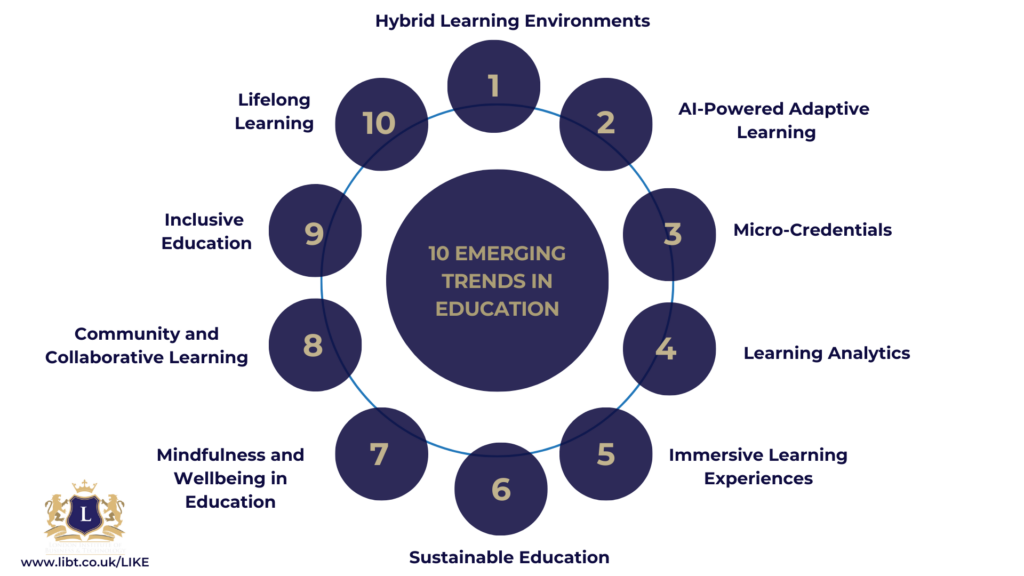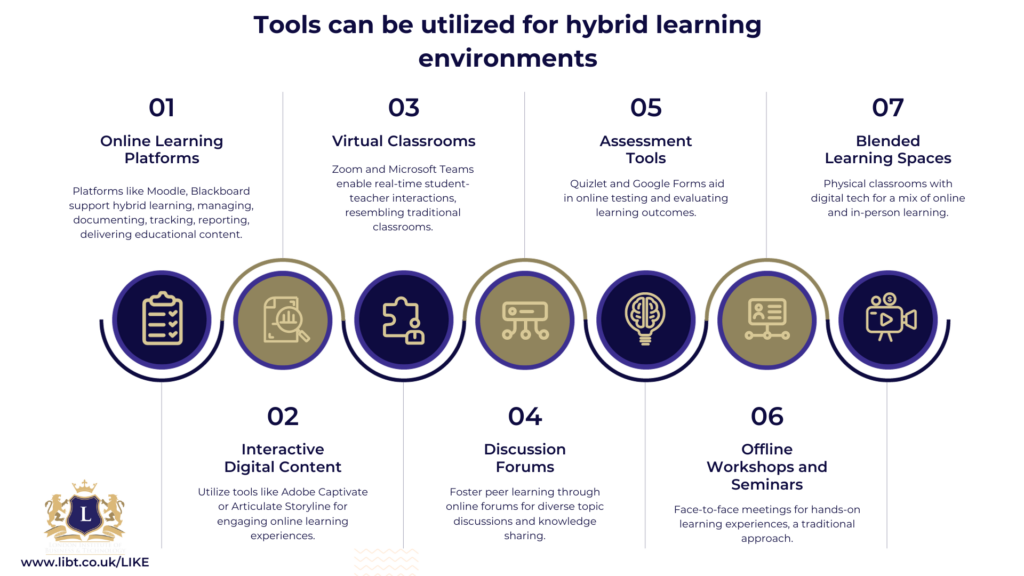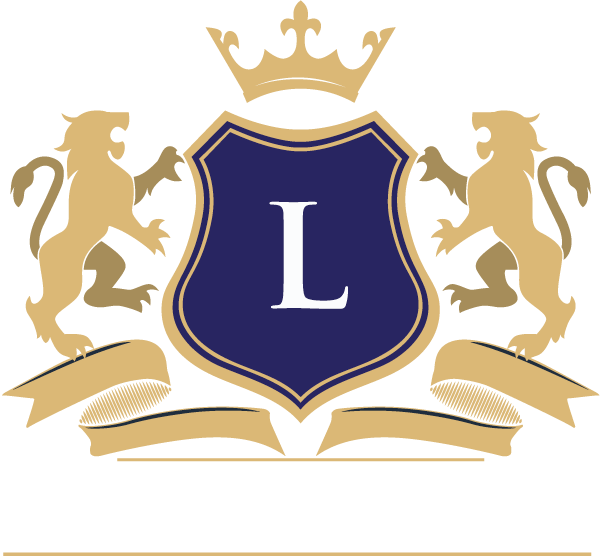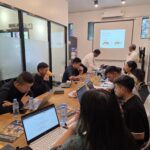In the ever-evolving educational domain, keeping abreast of the latest trends reshaping learning and teaching is vital. As we progress further into the 21st century, education persistently experiences significant shifts. Our Learning Innovation and Knowledge Enhancement (LIKE) Centre at LIBT has become pivotal in recognizing and nurturing these emerging trends, all with the objective of enhancing the learning journey. In this article, we unveil ten trends poised to transform the educational terrain, which we anticipate will become central in this transformative endeavor, symbolizing a point where innovation melds with knowledge enrichment. I aim to delve into ten emerging trends in education, as currently employed or envisaged for future application at the LIKE Centre to craft educational products.

The Ten Emerging Trends in Education
1. AI-Powered Adaptive Learning
AI-Powered Adaptive Learning leverages the capabilities of Artificial Intelligence (AI) to create personalized learning pathways that continuously evolve based on individual student performance and preferences. This modern pedagogical approach aims to enhance the learning experience by tailoring the content delivery and assessment strategies to each learner’s pace, understanding level, and learning style. For instance, in a platform like OpenEdX, integrating AI-driven adaptive learning can be accomplished by utilizing AI algorithms that analyze students’ interaction data and performance metrics. These algorithms can help in dynamically adjusting the learning content, difficulty level, and the sequence of topics to better suit each learner’s needs. For example, if a student is struggling with a particular concept, the system can automatically provide additional resources, exercises, or even alter the learning path to ensure a more solid understanding before moving on to the next topic. Likewise, for students who grasp concepts quickly, the system can offer advanced exercises or accelerate their learning pace. Furthermore, AI can enable real-time feedback, helping students to identify areas of improvement instantly, and suggesting personalized remedial measures.
2. Micro-Credentials
Micro-credentials present a forward-thinking approach to education by offering students the chance to acquire targeted skills and knowledge through compact, focused courses. Unlike traditional degrees, micro-credentials are typically quicker to complete and are centered around acquiring proficiency in specific skill sets that are immediately applicable in the workplace. This form of education is particularly tailored to meet the evolving demands of the modern workforce where upskilling and reskilling have become imperative. For instance in LIBT, within OpenEdX, we integrated a micro-credentialing system that could entail the development of a range of short, specialized courses or modules covering niche areas like data analytics, digital marketing, or project management. Each micro-credential course could have a clear set of learning objectives and competency-based assessments to ensure mastery of the particular skill set. Upon successful completion, learners could earn digital badges or certificates which can be shared on professional networking platforms like LinkedIn, showcasing their acquired competencies to potential employers. The OpenEdX platform can further enhance the micro-credentialing experience by incorporating features like real-time progress tracking, peer interaction forums, and industry-aligned capstone projects.
3. Learning Analytics
Learning Analytics entails the employment of data analytics to meticulously track and analyze student performance, thereby furnishing valuable insights that can aid in customizing teaching methodologies and strategies for optimal results. For instance, learning analytics can be integrated through tools and plugins that capture and analyze data regarding student interactions , engagement levels, and assessment outcomes in a Learning Management System. The analysis could reveal patterns like the time spent on certain topics, frequent errors made in assessments, or the effectiveness of various teaching materials. Based on these insights, educators can modify the content delivery, enrich resources, or provide additional support in areas where students struggle, ensuring a more effective and personalized learning experience. Moreover, learning analytics can also offer predictive insights on potential learning roadblocks or student disengagement, allowing for proactive measures to enhance the learning journey. The implementation of learning analytics is quintessential in today’s educational scenario as it not only enables a tailored learning path for students but also empowers educators with data-driven decision-making. This in turn cultivates a more engaging, transparent, and outcome-oriented educational environment, aligning educational objectives with individual learner progress and overarching academic goals.
4. Hybrid Learning Environments
Hybrid Learning Environments are an amalgamation of both online and offline (or traditional) learning experiences, which aim to deliver a more flexible and personalized education to cater to a variety of learning preferences. The essence of a hybrid learning model lies in its ability to combine the strengths of digital learning platforms with the traditional classroom interactions, thus facilitating a rich learning ecosystem. At the LIKE Centre, the creation of Hybrid Learning Models is geared towards accommodating the diverse learning inclinations of students.

5. Immersive Learning Experiences
Immersive Learning Experiences, leveraged through Virtual Reality (VR) and Augmented Reality (AR) technologies, usher in a revolutionary approach to education by transporting students beyond the conventional classroom settings into more engaging and interactive learning environments. These technologies encapsulate learners in a 3D educational landscape or overlay digital information in the physical world, thus making learning more interactive, engaging, and enjoyable. The utilization of VR and AR in education cultivates a more hands-on and experiential form of learning which is known to enhance retention and understanding. For instance, instead of merely reading about historical events or scientific concepts, students can virtually step into and explore these scenarios, making the learning experience significantly more impactful and memorable. Moreover, these immersive technologies cater to a variety of learning styles, making education more inclusive and personalized.
6. Sustainable Education
Promoting education that focuses on sustainability, fostering a generation that is more aware of environmental issues and equipped to address them. At the LIKE Centre, we are ardently working towards integrating Sustainable Education in our curriculum, aimed at nurturing a generation with a heightened awareness and understanding of environmental issues, along with the skills necessary to address them. Through a blend of theoretical knowledge and practical activities, we aim to instill a strong sense of environmental stewardship among students. Our curriculum includes courses and projects focusing on sustainability practices, renewable energy, and eco-friendly innovations. By fostering a learning environment that mirrors real-world ecological challenges, we aim to cultivate a generation of eco-conscious individuals who are equipped to contribute towards a sustainable future.
7. Mindfulness and Wellbeing in Education
Incorporating mindfulness practices and a focus on wellbeing into the educational curriculum, fostering a healthier learning environment. The LIKE Centre recognizes the imperative role that mindfulness and wellbeing play in fostering a conducive learning environment. Hence, we are working on integrating mindfulness practices and wellbeing-focused modules within the educational curriculum. These initiatives include guided mindfulness sessions, stress management workshops, and resources promoting physical and mental wellness. We believe that a balanced approach towards education, one that caters to not only cognitive but also emotional and psychological well-being, significantly enhances the overall learning experience and cultivates a healthier, more balanced educational environment.
8. Community and Collaborative Learning
Fostering community engagement and collaborative learning practices, encouraging students to learn from and with each other. It is the cornerstone of the progressive educational model we are striving to build at the LIKE Centre. We believe learning is a communal endeavor and flourishes in a collaborative environment. Hence, we are trying to build and foster community engagement and collaborative learning practices through community outreach initiatives, and interactive discussion forums. If possible for your institute, promoting a culture where students learn from and with each other, and are encouraged to engage with the broader community, we aim to build a learning ecosystem that is interactive, inclusive, and socially enriching. This approach not only enhances academic learning but also develops essential life skills such as teamwork, communication, and problem-solving, thus making education at LIKE Centre a holistic and collaborative venture.
9. Inclusive Education
Working towards creating a more inclusive educational landscape, where diversity is celebrated, and everyone has an equal opportunity to learn is what we aim to achieve at the LIKE Centre. We are dedicated to establishing a more inclusive educational landscape, embracing diversity and ensuring equal learning opportunities for all. Our endeavors towards inclusive education encompass the adaptation of teaching methods, curricula, and learning environments to cater to a wide range of learning needs and preferences. We are also invested in ensuring representation and inclusivity in both our student and staff populations. Promoting a culture of respect, understanding, and equality, can create an educational environment where every individual feels valued, respected, and capable of achieving their educational goals. Through these initiatives, you can envisage fostering a rich learning community that celebrates diversity and inclusivity at its core.
10. Lifelong Learning
Lifelong Learning is a principle we ardently advocate for at LIBT. We believe that learning should not be confined to just a phase of life but should be an ongoing endeavor. Hence, we are working towards nurturing a culture that encourages individuals to continually seek knowledge, improve, and evolve, irrespective of their age or career stage. Our initiatives include offering a wide array of courses, workshops, and seminars that cater to diverse interests and professional needs, along with promoting a community of learners who share, interact, and learn from each other beyond the conventional classroom setting. Through these efforts, we aim to contribute towards a society where the quest for knowledge is perennial, and the zest for learning is unbounded, underlining the ethos of Lifelong Learning.
Conclusion
The exploration of the ten emerging trends in education from the vantage point of the LIKE Centre at LIBT showcases an ambitious yet attainable vision of what contemporary education can evolve into. These trends embody a holistic approach, intertwining technology, inclusivity, sustainability, and human-centric principles to foster a rich, engaging, and meaningful learning journey. As we navigate through the unique blend of traditional and modern educational paradigms, the LIKE Centre emerges as a microcosm of broader educational transformation. These trends underscore the evolving nature of learning and the boundless potential that lies in harnessing innovation for knowledge enrichment. As we delve into these trends and work towards integrating them at the LIKE Centre, a pertinent question arises: How can we ensure that the integration of these trends remains responsive to the dynamic needs of learners, educators, and the broader societal context?







Leave a Reply
You must be logged in to post a comment.